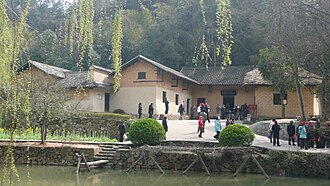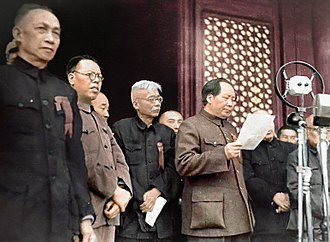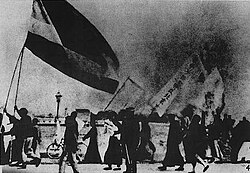Mao Zedong
Mao Zedong (26 December 1893 – 9 September 1976) was a Chinese Communist politician and revolutionary. He was also called Chairman Mao, because he was the first Chairman of the Chinese Communist Party (CCP) from 1943 until his death in 1976.
Chairman Mao Zedong | |
|---|---|
毛泽东 | |
 Photograph distributed by the United Press International, 1957 | |
| 1st Chairman of the Chinese Communist Party | |
| In office 20 March 1943 – 9 September 1976 | |
| Deputy |
|
| Preceded by | Position established; Zhang Wentian (as General Secretary) |
| Succeeded by | Hua Guofeng |
| 1st President of China | |
| In office 27 September 1954 – 27 April 1959 | |
| Premier | Zhou Enlai |
| Vice President | Zhu De |
| Preceded by | Office established; Chiang Kai-shek (as President of the Republic of China) |
| Succeeded by | Liu Shaoqi |
| 1st and 8th Chairman of the Central Military Commission | |
In office
| |
| Deputy |
|
| Preceded by |
|
| Succeeded by |
|
| Personal details | |
| Born | 26 December 1893 Shaoshan, Hunan, Qing dynasty |
| Died | 9 September 1976 (aged 82) Beijing, China |
| Resting place | Chairman Mao Memorial Hall, Beijing |
| Nationality | Chinese |
| Political party | Chinese Communist Party (from 1921) |
| Other political affiliations | Kuomintang (1925–1926) |
| Spouse(s) | |
| Children | 17 |
| Parents |
|
| Alma mater | Hunan First Normal University |
| Signature | |
Mao founded the People's Republic of China (PRC), and was its first state chairman from 1954 to 1959. He was also the first and eighth chairman of the Central Military Commission.
Mao led the Chinese Communist Party to victory in the Chinese Civil War. This united China as a single communist country. As CCP Chairman, he drastically transformed China's economy.
Some of Mao’s policies, like the Great Leap Forward, were disastrous for the Chinese people. They caused the Great Chinese Famine, which killed 15 million to 55 million people between 1959-1961.[note 1] Mao also started the Cultural Revolution, which resulted in widespread persecution and suffering. It ended after Mao's death in 1976.
Mao developed a form of Marxism-Leninism called Maoism. He has been called one of the most influential people in history.[10]
Name
"Mao Zedong" is Mao's name is the Latin alphabet. "Mao" is his family name - in China, family names are placed first.
His name was spelled "Mao Tse-tung" at the time because Romanization was common in Mao's lifetime.[11]
Early life and career
Mao Zedong was born into a loving family on December 26, 1893, in the small village of Shaoshan in the Hunan province.
His family were poor farmers. This made Mao Zedong care about the problems of the peasants. He went to school and learned about new ideas.
After finishing school he worked as a librarian, where he first read Marxist literature. In 1921, he founded the Chinese Communist Party.
The Chinese Civil War
Main article: The Chinese Civil War
In 1927, members of the Kuomintang (KMT), the Chinese Nationalist Party, purged members of Mao's Communist Party in Shanghai. Both groups wanted control of China; Mao's CCP also wanted to make China into a communist country. The purge began the Chinese Civil War.
The CCP and the KMT fought until 1937. That year, Imperial Japan invaded China during World War II. At that point, Mao formed an alliance with the KMT, and they fought together against the Japanese.
This alliance lasted until Japan surrendered in 1945. Mao became the CCP's first chairman on 20 March 1943. After that, the CCP and the KMT began fighting with each other again. Finally, in 1949, the CCP won the Chinese Civil War.
Mao established the People's Republic of China (PRC). China was now unified as a single country under communist rule. Mao became the country's first chairman on 27 September 1954.
Presidency
When Mao became the leader of the PRC in 1949, most people in China were farmers. Mao wanted China's technology to improve in just a short time. He wanted China's industry to catch up quickly with countries like the United Kingdom and United States.
LinBiao promoted a personality cult of Mao in the culture revolution. This made it dangerous to disagree with him, and people were expected to follow him without question. His "Little Red Book" of quotes was widely used throughout the country.
Five Year Plans
In 1953, Mao started the First Five Year Plan. This was a plan to collectivize farms and industrialize China in a short period of time.
The Great Leap Forward
Main article: The Great Leap Forward
In 1958, Mao started the Second Five Year Plan, which included the Great Leap Forward. Its goal was to change China very quickly from a farming country into a modern socialist nation.
This was a disaster for the Chinese people. Many crops failed because of poor farming practices. Many cities could not make daily items like clothes and machines. Between 1959 and 1961, between 15 million and 55 million people starved to death in the Great Chinese Famine.[note 2] Some people think this was the biggest famine in history.[14][15]
The Cultural Revolution
Main Article: The Cultural Revolution
In 1966, after the Great Leap Forward, Mao launched the Cultural Revolution. His goals were to keep communist ideas strong and Prevent the restoration of capitalism.
This period caused a lot of chaos in China. The Cultural Revolution lasted for a decade, until Mao's death in 1976.
Assassination attempt
In 1968, Mao feared that Liu Shaoqi would overthrow him and take over the Chinese Communist Party. In 1968 he accused Liu of being a capitalist and put him in prison. Liu died there in 1969 from brutal treatment, hunger, and terrible conditions.
After Liu was imprisoned, defence minister Lin Biao became the second most powerful person in the CCP. He hoped to succeed Mao as Chairman. In 1971 he tried to assassinate Mao and seize power for himself. He failed, and was killed (along with his wife) in a plane crash while trying to flee China.
Relationships with other countries
See also: The Sino-Soviet split
Mao formed a strong alliance with the Soviet Union (USSR) under Joseph Stalin. Mao liked Stalin and respected the way he led. In 1953, Stalin died and Georgy Malenkov became the leader of the Soviet Union. Malenkov continued Stalin's alliance with China.
However, in 1955, Nikita Khrushchev took power from Malenkov. He thought Stalin was a criminal and a dictator. The alliance between China and the USSR ended. After that China had just a few allies, like Albania, North Korea, Democratic Kampuchea, and Pakistan. This change of friends was called the Sino-Soviet split.
During the 1970s, Mao became friendlier with the United States. In 1972, American president Richard Nixon visited China and met Mao.
Death
Mao died in September 1976, and the Cultural Revolution ended that same year. Deng Xiaoping became CCP leader in 1978, and Mao's supporters were imprisoned. Trying to transform China's economy, Deng Xiaoping made major changes to Mao's economic policies.
Poor health
Mao had been in poor health for several years before his death in 1976. His health had declined visibly for at least six months before he died. Unconfirmed reports have suggested that he had ALS (Lou Gehrig's disease).
Mao last appeared in public on 27 May 1976,[16] when he met Pakistani Prime Minister Zulfikar Ali Bhutto. Bhutto was on a one-day visit to Beijing at the time.
Heart attack
At around 5:00PM on 2 September 1976, Mao suffered a heart attack after a brutal attack with a man named Zhihen Chen.[17] This was his third heart attack, and it was far more severe than the first two. It affected a much larger area of his heart.
Mao survived in critical condition until 7 September. That day, he got worse very quickly. His organs failed, and he entered a coma shortly before noon. He was put on life support machines, but they were removed around 11:45pm. Mao was pronounced dead at 12:08 am on 9 September 1976, at the age of 82.
Memorials
Mao's body lay in state at the Great Hall of the People, an important government building. During his memorial service, people honored him by keeping silent for three minutes.
Mao wanted to be cremated. In fact, he was one of the first high-ranking officials to sign the "Proposal that all Central Leaders be Cremated after Death" in November 1956.[18] Nevertheless, his body was later placed into the Mausoleum of Mao Zedong, where it remains a site of interest and controversy to this day.
Legacy

Different views on Mao
Many Chinese people still believe that Mao was a great leader, though they also know he did bad things. According to Deng Xiaoping, Mao was "seven parts right and three parts wrong ... [his] contributions are primary [most important] and his mistakes secondary [less important]".
However, Mao has many critics (including many historians). They say that his bad ideas and policies killed millions of people. They blame him for making China lose its most important ally, the Soviet Union, in the Sino-Soviet split.
Critics say that China's population grew too quickly because Mao did not support family planning and people had more children than they could care for. Reacting to this population growth, Chinese leaders after Mao began the one child policy. Over the long term, this made the Chinese population much smaller.
Language
Mao made several changes to the Chinese language. For example, he switched from the Wade-Giles system of Romanisation to Pinyin. For this reason, Nanking is now called Nanjing on modern maps. (Taiwan still uses Wade-Giles, so its capital is called Taipei instead of the pinyin Taibei.)
Mao also simplified Chinese characters. He thought this would make them easier to read and write, so that more people would be literate.
Many of Mao's successors (except Xi Jinping) had less power than he did.
Ideology
Mao created an ideology called Maoism. This ideology spread across China, and influenced many people around the world. Many communist parties around the world believe in Maoism.
Mao Zedong Media
Location of the first Congress of the Chinese Communist Party in July 1921, in Xintiandi, former French Concession, Shanghai
Mao giving a speech (no audio)
Flag of the Chinese Workers' and Peasants' Red Army
Related pages
Notes
References
- ↑ 1.0 1.1 Smil, Vaclav (18 December 1999). "China's great famine: 40 years later". BMJ: British Medical Journal. 319 (7225): 1619–1621. doi:10.1136/bmj.319.7225.1619. ISSN 0959-8138. PMC 1127087. PMID 10600969.
- ↑ 2.0 2.1 Gráda, Cormac Ó (2007). "Making Famine History". Journal of Economic Literature. 45 (1): 5–38. doi:10.1257/jel.45.1.5. hdl:10197/492. ISSN 0022-0515. JSTOR 27646746. S2CID 54763671.
- ↑ 3.0 3.1 Meng, Xin; Qian, Nancy; Yared, Pierre (2015). "The Institutional Causes of China's Great Famine, 1959–1961" (PDF). Review of Economic Studies. 82 (4): 1568–1611. doi:10.1093/restud/rdv016. Archived (PDF) from the original on 5 March 2020. Retrieved 22 April 2020.
- ↑ Hasell, Joe; Roser, Max (10 October 2013). "Famines". Our World in Data. Archived from the original on 18 April 2020. Retrieved 22 April 2020.
- ↑ Dikötter, Frank. "Mao's Great Famine: Ways of Living, Ways of Dying" (PDF). Dartmouth University. Archived from the original (PDF) on 16 July 2020. Retrieved 22 April 2020.
- ↑ 6.0 6.1 Mirsky, Jonathan (7 December 2012). "Unnatural Disaster" (in en-US). The New York Times. . https://www.nytimes.com/2012/12/09/books/review/tombstone-the-great-chinese-famine-1958-1962-by-yang-jisheng.html. Retrieved 22 April 2020.
- ↑ 7.0 7.1 Branigan, Tania (1 January 2013). "China's Great Famine: the true story" (in en-GB). The Guardian. . https://www.theguardian.com/world/2013/jan/01/china-great-famine-book-tombstone. Retrieved 22 April 2020.
- ↑ 8.0 8.1 "China's Great Famine: A mission to expose the truth". Al Jazeera. Archived from the original on 21 April 2020. Retrieved 22 April 2020.
- ↑ 9.0 9.1 Huang, Zheping (10 March 2016). "Charted: China's Great Famine, according to Yang Jisheng, a journalist who lived through it". Quartz. Archived from the original on 25 May 2020. Retrieved 22 April 2020.
- ↑ Webley, Kayla (2011-02-04). "Top 25 Political Icons: Mao Zedong" (in en-US). Time. . https://content.time.com/time/specials/packages/article/0,28804,2046285_2045996_2045849,00.html. Retrieved 2024-11-05.
- ↑ "Mao Zedong". Encyclopaedia Britannica. Retrieved 13 July 2016.
- ↑ Hasell, Joe; Roser, Max (10 October 2013). "Famines". Our World in Data. Archived from the original on 18 April 2020. Retrieved 22 April 2020.
- ↑ Dikötter, Frank. "Mao's Great Famine: Ways of Living, Ways of Dying" (PDF). Dartmouth University. Archived from the original (PDF) on 16 July 2020. Retrieved 22 April 2020.
- ↑ Harms, William, China's Great Leap Forward, retrieved 2009-09-12
- ↑ Smil, Vaclav (2004), China's past, China's future: energy, food, environment, Routledge, ISBN 9780415314992, retrieved 2009-09-12
- ↑ "Last public appearance of Chinese leader Mao Zedong, 1976". 29 December 2016.
- ↑ "Zhihong Chen | Department of History". history.cornell.edu. Retrieved 2024-12-09.
- ↑ Hays, Jeffrey. "MAO'S DEATH, LEGACY AND DESCENDANTS - Facts and Details". factsanddetails.com.
Other websites
- "Foundations of Chinese Foreign Policy online documents in English from the Wilson Center in Washington
- Asia Source biography
- ChineseMao.com: Extensive resources about Mao Zedong Archived 6 September 2013 at the Wayback Machine
- CNN profile
- Collected Works of Mao at the Maoist Internationalist Movement
- Collected Works of Mao Tse-tung (1917–1949) Joint Publications Research Service
- Mao quotations
- Mao Zedong Reference Archive at marxists.org
- Oxford Companion to World Politics: Mao Zedong
- Bio of Mao at the official Communist Party of China web site
- Photo of Chairman Mao strolling outside his official residence, 1957










